
Leg before wicket (lbw) is one of the ways in which a batter can be dismissed in the sport of cricket. Following an appeal by the fielding side, the umpire may rule a batter out lbw if the ball would have struck the wicket, but was instead intercepted by any part of the batter's body. The umpire's decision will depend on a number of criteria, including where the ball pitched, whether the ball hit in line with the wickets, and whether the batter was attempting to hit the ball.
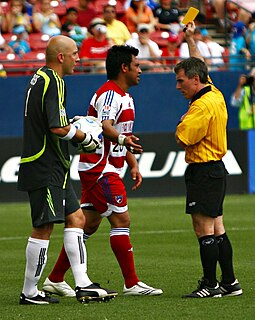
A referee or simply ref is the person of authority in a variety of sports who is responsible for presiding over the game from a neutral point of view and making on-the-fly decisions that enforce the rules of the sport, including sportsmanship decisions such as ejection. The official tasked with this job may be known, in addition to referee, by a variety of other titles as well, including official, umpire, judge, arbiter, arbitrator, linesman, commissaire, timekeeper, touch judge or Technical Official.

The infield fly rule is a rule of baseball that treats certain fly balls as though caught, before the ball is caught, even if the infielder fails to catch it or drops it on purpose. The umpire's declaration of an infield fly means that the batter is out regardless of whether the ball is caught. The rule exists solely to prevent the defense from executing a double play or triple play by deliberately failing to catch a ball that an infielder could catch with ordinary effort.
Dead ball is a term in many ball sports in which the ball is deemed temporarily not playable, and no movement may be made with it or the players from their respective positions of significance. Depending on the sport, this event may be quite routine, and often occurs between individual plays of the game.
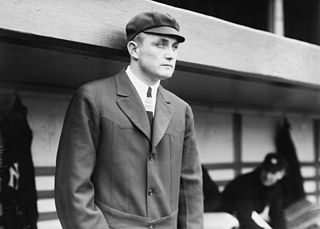
William George Evans, nicknamed "The Boy Umpire", was an American umpire in Major League Baseball who worked in the American League from 1906 to 1927. He became, at age 22, the youngest umpire in major league history, and later became the youngest to officiate in the World Series at age 25.
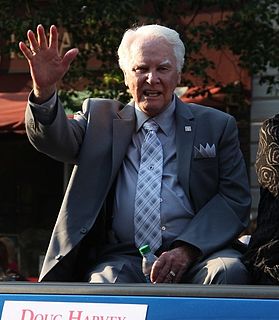
Harold Douglas Harvey was an umpire in Major League Baseball (MLB), who worked in the National League (NL) from 1962 through 1992.
Law 41 of the Laws of Cricket covers unfair play. This law has developed and expanded over time as various incidents of real life unfair play have been legislated against.
Donald Anton Denkinger is a former Major League Baseball umpire who worked in the American League from 1969 to 1998. Denkinger wore uniform number 11, when the AL adopted uniform numbers in 1980. He is best remembered for an incorrect safe call he made at first base in Game 6 of the 1985 World Series, which came to be known as The Call.

In sports, an ejection is the removal of a participant from a contest due to a violation of the sport's rules. The exact violations that lead to an ejection vary depending upon the sport, but common causes for ejection include unsportsmanlike conduct, violent acts against another participant that are beyond the sport's generally accepted standards for such acts, abuse against officials, violations of the sport's rules that the contest official deems to be egregious, or the use of an illegal substance to better a player's game. Most sports have provisions that allow players to be ejected, and many allow for the ejection of coaches, managers, or other non-playing personnel.

The rules of Australian rules football were first formed by the Melbourne Football Club in 1859, and been refined over the years as the game evolved into its modern form. The laws significantly predate the advent of a governing body for the sport. The first national and international body, the Australasian Football Council, was formed in 1905 to govern Australian Football. Since 1994, the rules for the game known as Australian football have been governed by the AFL and the organisation's Laws of the Game committee.
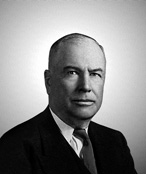
Ernest Cosmos Quigley was a Canadian-born American sports official who became notable both as a basketball referee and as an umpire in Major League Baseball. He also worked as an American football coach and official.

Penalty cards are used in many sports as a means of warning, reprimanding or penalising a player, coach or team official. Penalty cards are most commonly used by referees or umpires to indicate that a player has committed an offense. The official will hold the card above his or her head while looking or pointing towards the player that has committed the offence. This action makes the decision clear to all players, as well as spectators and other officials in a manner that is language-neutral. The colour or shape of the card used by the official indicates the type or seriousness of the offence and the level of punishment that is to be applied. Yellow and red cards are the most common, typically indicating, respectively, cautions and dismissals.
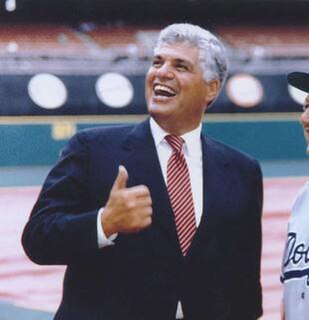
Richard G. Phillips was the former general counsel and executive director of the 52-member Major League Umpires Association (MLUA), having held those positions from 1978 to 2000. He is most notable for recommending that the union baseball umpires resign en masse effective September 2, 1999 to leverage enhanced benefits for union umpires. This decision ultimately turned out to be devastating to the umpires, as Major League Baseball accepted most of their resignations, terminating their employment and promoting replacement umpires from the minor leagues. The umpires later voted to decertify the union, replacing it with the World Umpires Association. He had also served in the same positions for the National Association of Basketball Referees.

C. B. Bucknor is an umpire in Major League Baseball (MLB) who worked in the National League (NL) from 1996 to 1999 and has worked in both major leagues since 2000.
John Wakefield Holder is an English former first-class cricketer and Test umpire.
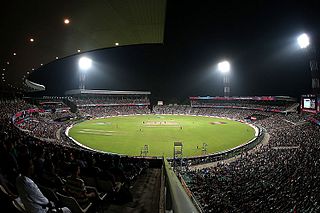
Cricket is a bat-and-ball game played between two teams of eleven players on a field at the centre of which is a 20-metre (22-yard) pitch with a wicket at each end, each comprising two bails balanced on three stumps. The batting side scores runs by striking the ball bowled at the wicket with the bat, while the bowling and fielding side tries to prevent this and dismiss each player. Means of dismissal include being bowled, when the ball hits the stumps and dislodges the bails, and by the fielding side catching the ball after it is hit by the bat, but before it hits the ground. When ten players have been dismissed, the innings ends and the teams swap roles. The game is adjudicated by two umpires, aided by a third umpire and match referee in international matches. They communicate with two off-field scorers who record the match's statistical information.

Daniel Anthony Bellino is an umpire in Major League Baseball.
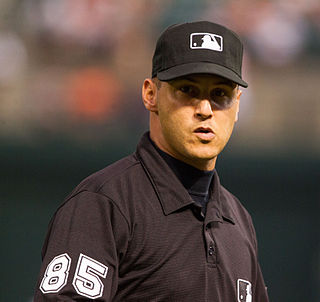
Victor Joseph Carapazza is a Major League Baseball umpire. He wears uniform number 19, and previously wore uniform number 85.














